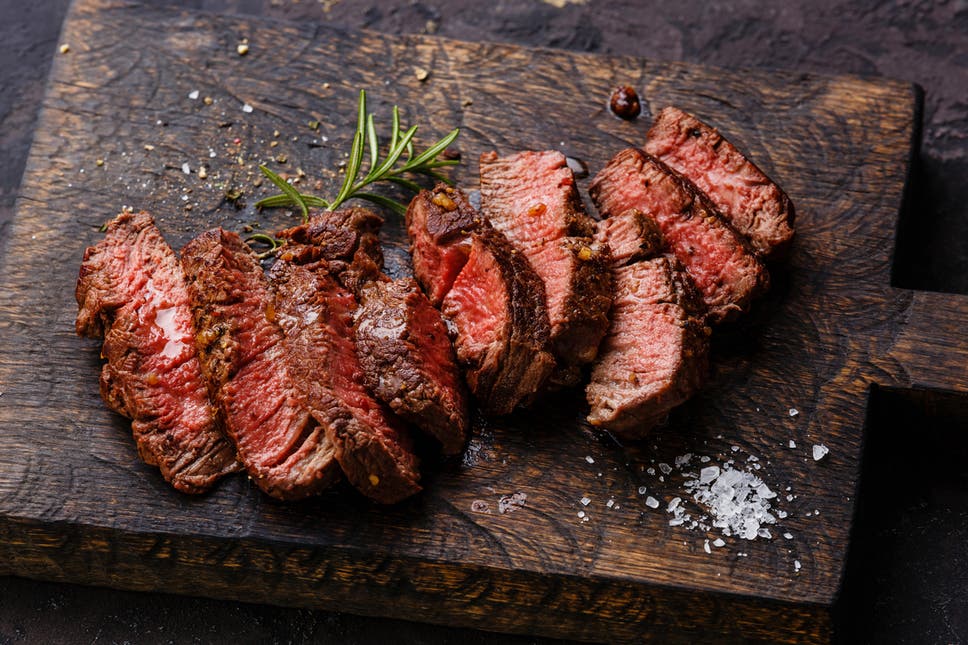‘CARNIVORE DIET’: NEW SOCIAL MEDIA TREND CRITICISED BY NUTRITIONISTS AS ‘VERY DAMAGING’

Despite rising numbers of vegans and vegetarians, the latest diet fad being promoted by several social media influencers is the so-called ‘carnivore diet’, which sees people promoting eating just meat. No carbs, no fruit or veg. Just meat.
However health professionals have now heavily condemned the diet, highlighting that eating just meat deprives the body of many necessary nutrients.
In recent months, increasing numbers of people have been trying the carnivore diet and spreading the word on social media – there are currently over 30,000 posts under the #carnivorediet tag on Instagram – with people claiming existing on meat alone has seen them lose weight, reduce inflammation, lower blood pressure and boost libido.
But medical experts have pointed out that there is absolutely no scientific evidence to back up these claims, pointing out that the diet could lead to vitamin deficiencies.

The carnivore diet has evolved from the keto and paleo diets, which eschew carbs in favour of protein and fat. Some followers of the lifestyle include fish, dairy products and eggs in their diets too.
Although there are health benefits to meat – it’s a great source of protein, B vitamins, iron, zinc and magnesium – many nutritionists and dietitians have raised concerns that following the carnivore diet is unhealthy.
“I honestly think one of the biggest risks of the carnivore diet is colon cancer,” nutrition professor Rachele Pojednic told Lifehacker. “But we won’t have data on that for years to come (and this would also mean that someone needs to do a study on this diet, which I honestly don’t see happening).”
As the lifestyle advocates focussing on fatty meats, followers run the risk of raising their levels of LDL cholesterol, which can lead to an increased risk of heart disease and heart attacks.
“One thing you can’t ignore is there are some nutrients you just can’t get from meat,” Harley Street nutritionist Rhiannon Lambert wrote on Instagram.

She explains that only eating meat deprives your body of folate, vitamins C and E, and fibre, which are all essential for good health: “that’s why sailors used to get scurvy with not enough vitamin C in their largely fish diets.”
What’s more, subsisting on meat alone doesn’t provide the body with fibre, which is essential to promote a healthy gut.
“Meat also tends to push the balance of our good and bad cholesterol (called HDL and LDL) towards the bad end,” the Re-Nourish author adds
Lambert is also concerned that following such a restrictive diet could lead to disordered eating and an unhealthy relationship with food.
She believes the advice influencers are sharing has the potential to be “very damaging”.
One of the most outspoken proponents of the diet is 26-year-old Mikhaila Peterson – daughter of controversial YouTuber and author of 12 Rules for Life Jordan Peterson – who claims consuming solely beef, salt, water and bourbon “cured” her of arthritis and depression, even though there is no scientific evidence that this is true.
Also amongst the most vocal advocates of the diet is former orthopaedic surgeon Shawn Baker, whose license to practice medicine was revoked last year.
“Individuals who have a high social media following are highly influential and have a huge impact on the people who follow their posts,” Lambert tells The Independent. “Influencers have a responsibility not to mislead people with anecdotal advice.
“Anecdotal advice that is not based on scientific evidence and can potentially be very damaging to those who choose to listen to it. All of us are unique and our bodies are very different.
“We all react in different ways to various foods and what works for one person will not work for someone else. In particular when it comes to diet, encouraging the elimination of whole food groups is extremely irresponsible.
“It is essential that if you are looking for advice in regards to your health and nutrition, that you seek professional advice from a registered nutritionist or dietitian.”
source:-independent